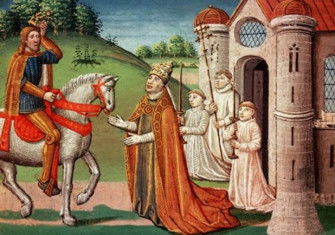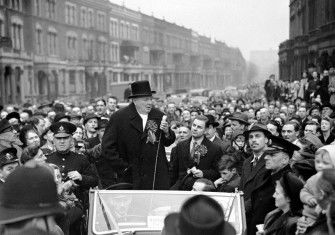Good Time Charlie
A new book presents an account of Charlemagne, year by year, without hindsight.

This is a terrific book – but that statement needs context. Charlemagne does not lack biographers. Jinty Nelson in an early footnote lists ten, just in the last 20 years. Why, and why add another? As to the first of these questions: Charlemagne was, as Nelson says on her first page, ‘by any standards extraordinary’. Living from 742 to 814, king from 768, emperor of the West from 800, ruler of the largest empire to have existed in Europe after the end of the western Roman empire in the fifth century (excluding the short-lived realms of Napoleon and Hitler), and conqueror of nearly half of it: if he was not extraordinary, he was at least extraordinarily lucky.
Charlemagne simply means Charles ‘the Great’ in French, Karolus magnus in Latin; the ‘magnus’ was not an adjective used much in his lifetime, and Nelson just calls him ‘Charles’. He was not just a conqueror; he was also an innovator. The pan western-European governmental structures which developed in his reign lasted in many cases and places for centuries. He set up a court full of intellectuals, who made a lot of money out of being there and who wrote jokey poems praising each other, but who also helped him write legislation that was startlingly ambitious and occasionally even effective. He kept an array of greedy, touchy and self-important aristocrats around him and eager to come to his regular assemblies, without (hardly) ever revolting against him. They all benefited from the conquests, but the ambitious always want more; still, Charles kept control of them. And, on top of this political, military and pragmatic skill, Charles seems to have had a good time, with jokes, a lot of sex and swimming, as well as hunting (though not, his contemporary biographer Einhard said, a bit implausibly, drinking). What’s not to like? Well, his ruthlessness for sure. Plenty of people died because they were in the way. But people have been able to forgive that because of his success; historians, and not only them, bow down to power more than they should.
So this is why Charles gets biographers, and indeed has had too many of them; many of them are pretty dutiful, telling the same story over and over. This one is different. Jinty Nelson has worked on it for years, with a precise aim in mind: to construct an account of Charles without hindsight, year by year. She looks at the choices he made when he made them, without any knowledge of what would come after. Charles indeed took risks; he could not have known if they would work. For example: one of Nelson’s bravura chapters treats Charles’ conquest of the Lombard kingdom of northern and central Italy in 773-4. This was, on the surface, one of his most straightforward; he did it in a year, almost without a battle. Nelson argues that it was not supposed to be a conquest at all, but rather (quite a risky) military attack aimed at getting hold of Charles’ nephews, who had a good claim to half Charles’ kingdom and who had taken refuge with the Lombard king Desiderius. Only halfway through, when Charles made a side-trip to Rome while his army was besieging Desiderius’ capital, did he really take on board the possibilities of actual conquest. Nelson makes these points convincing simply by tracking each choice he made separately: why did he do precisely this, then? What must he have been thinking? It only makes sense if he was calculating that … But then, when it worked, he built on the success and pushed it in a different direction. Charles here stops being the master strategist of several other accounts; but in his successful improvisation, he certainly takes centre stage as a master tactician. In this case, he took the kingdom as well as ‘disappearing’ his nephews – whom Nelson several times calls the Princes in the Tower, despite the absence of a tower; she is not shy of pointing to the nastier side of her subject’s actions, as well as his successes.
This is a long book, but it is lovely to read, in part because it is so lightly written. Nelson focuses on vignettes; and one can paint a portrait very successfully if there are enough vignettes. Each chapter is divided into separate sections: ‘How Charles lost his first milk tooth’; ‘Charles’s letter to [his wife] Fastrada’; ‘Hostage management, Mainz, 805’; each treated in its own terms, with source criticism and analysis as well as scene-painting. Some are under a page (‘The eclipse of 16 September 787’). They reflect Nelson’s firm purpose, to stay in the present and avoid hindsight. It sometimes leads to repetition, but that is actively useful in a book this size. The book is not, and does not want to be, a structural study. What were Charles’ long term aims? How did he develop them? How, and how far, did his government work? What were the social structure and cultural norms of his court and how did they change across nearly 50 years of rule? You can’t get at these from a year-by-year study. But the more I read Nelson’s short sections, the more I saw that this method works. It has the narrative drive of many novels and is totally accessible to non-experts, who I hope will be most of its readers, because it explains everything it needs to. It recreates the sense of contingency, of improvisation, indeed of fun, which evidently marked the daily choices and social world of the creator of an entire political system, as Charles was – even if the building blocks for it long preceded it, as they always do.
If you want an analysis of Charles’ governmental practices – as I certainly do as well – then Jenny Davis’ Charlemagne’s Practice of Empire (2015) fits the bill marvellously. But, even though we know that no one can reconstruct a personality out of texts – let alone texts as discontinuous as they always are in the early Middle Ages, even in a relatively well-documented period like this one – one leaves Jinty Nelson’s book with the sense that one does, yes, get from it a sense of what Charlemagne was actually like. Which is what biographies are for, and why this is one to read.
King and Emperor: A New Life of Charlemagne
Janet L. Nelson
Allen Lane
704pp £30
Chris Wickham is emeritus Chichele Professor of Medieval History at the University of Oxford.






